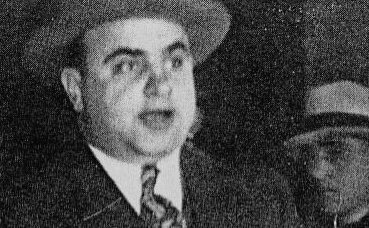
He bought Capone’s home with Capone's money, and later it was transferred to the name of the defendant's wife.
Everything was cash with Capone. The witness Ryder from Miami told you of the thousand dollar bill wrappers he saw lying around the Palm Island estate and said that Western Union boys were arriving every half hour.
Mattingly told the revenue agents that he would consult with Capone about his tax liability. Then he consulted with Capone and returned to the agents. His client was willing to co-operate with the Government, but did not want anything he said to be used against him for criminal prosecution.
He was told by Agent Wilson that the revenue agents office had nothing to do, with criminal prosecution, could extend no immunity. The taxpayer could talk if he pleased, but he did so at his own peril.
Then Mattingly decided to bring Capone in. Capone was present at this conference and heard what was said. If Mattingly overstepped his authority under his power of attorney from Capone, Capone had a chance to speak. And if he had not received a fair warning against incriminating statements before, this time he was certainly warned.
Mr. Herrick told him that any statements that could be used against him probably would be used. He didn't say they might be; he said they would. But when Mr, Herrick asked whether, according to the defendant's statements, the taxable years in question would be 1926 to 1929, inclusive, Capone himself spoke up. "That’s it, exactly," he said. That was the most significant thing about the interview--Capone's own admission of his liability.
Can you, gentlemen of the jury, entertain any serious doubt that Capone knew what this was about? He was there. He had a liability. He was willing to pay and he had the money. Even though he had lost from $47,000 to $110,000 a year on the races, as the defense has shown us, and his expenditures for luxuries had been, enormous, as we have shown, he still, had the money and wanted to pay his taxes. Is it conceivable, then, that he had no taxable income?
Then on September 30th, 1930, Mattingly brought in the letter. He had consulted with Capone and this was the best they could do - an estimate of taxable income of $26,000 for 1926, $40,000 for 1927 and $100,QOO each for the years 1928 and 1929.
He had tried to get the revenue agents to say that the admission would not be used against his client; now, in the letter, Mattingly is saying it himself. The letter says, "This statement is made without prejudice to the taxpayer in any criminal action that may be instituted against him."
Suppose a speeder, when stopped by an officer, should say; "I am telling you this without prejudice, officer; I don't want it used against me; but I was going 50 miles an hour." Suppose a gambler could tack a little sign on a roulette, “This device is not to be used as evidence against me.” Suppose a murderer could put a sign on his gun, "This weapon is not to be used as evidence against me." What a refuge for criminals that would be! And yet, that is what we have here, "I am telling you this, but it is not to be used against me."
....He always had a roll of one-hundred-dollar and five-hundred-dollar bills-a roll "big enough to choke an ox," as one witness testified. Yet when we tried to get from him an idea of his income, we had no help whatever from him. Why, when we asked him if he went under any name other than Capone, he said, "Oh, no"; yet in the evidence it developed that he went under the aliases of Ross and Costa....
One of his witnesses said he lost $110,000 on the races in 1929. He lost all the way from $40,000 to $110,000 with different gamblers. He bought jewelry in vast amounts for his friends. He bought expensive motor cars, and he lived on a lavish scale. Even if he did lose heavily on the races and spent money in other ways, he still had plenty left....Does anybody think that this man did not have a huge income? Why, the idea is ridiculous. Even a child would know better: He had an income that called for his paying to the government a substantial income tax....
